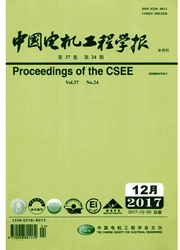

 中文摘要:
中文摘要:
以秸秆为研究对象,利用AspenPlus软件建立串行流化床稻秸气化制取富氢气体合成甲醇的模型,研究不同反应条件包括气化温度、气化压力、水蒸气与生物质(稻秸)的配比、液化温度及液化压力对甲醇产率的影响。结果表明:采用串行流化床稻秸水蒸气气化技术可获得氢浓度为55%以上的富氢燃气;在C301铜基催化剂作用下,对于以制甲醇为目的的串行流化床稻秸气化系统,气化温度建议在750℃左右,气化压力尽量接近常压,水蒸气与生物质配比在0.4-0.5内为佳,液化温度建议控制在220-240℃,液化压力为5MPa;在此最佳工况下,每千克的干燥无灰基稻秸可获得11.97mol的最大甲醇产量。研究成果为今后开展生物质气化及气化产气合成甲醇实验提供理论依据。
 英文摘要:
英文摘要:
Simulation of methanol synthesis via H2-rich syngas from rice straw gasification in interconnected fluidized beds was carried out, using Aspen Plus software to establish this model. Effects of operating parameters, including gasification temperature and pressure, steam /biomass (S/B) (rice straw) ratio, liquefaction temperature and pressure, on the methanol yield were analyzed. The results show that rice straw steam gasification can obtain 55% hydrogen-rich gas and when the C301 Cu-based catalyst was adopted as the methanol synthesis catalyst, the gasification temperature is suggested to be controlled at about 750℃ in the interconnected fluidized beds rice straw gasification system with the purpose of methanol production. Furthermore, the gasification pressure is proposed to approach to the ambient pressure and the SIB ratio of 0.4-0.5 operates better. The liquefaction temperature is proposed to be controlled between 220 and 240℃ and the liquefaction pressure of 5 MPa is adopted. On the optimal operating condition, the maximum of 11.97 mol per kg rice straw (daf) of methanol yield may be obtained. The research provides useful datas for the further study on biomass gasification and methanol synthesis from biomass syngas.
 同期刊论文项目
同期刊论文项目
 同项目期刊论文
同项目期刊论文
 Simulation of hydrogen production from biomass gasification in interconnected fluidized beds,Biomass
Simulation of hydrogen production from biomass gasification in interconnected fluidized beds,Biomass Flow behaviors of a large spout-fluid bed at high pressure and temperature by 3D simulation with kin
Flow behaviors of a large spout-fluid bed at high pressure and temperature by 3D simulation with kin Hydrodynamic characteristics of spout-fluid bed: Pressure drop and minimum spouting/spout-fluidizing
Hydrodynamic characteristics of spout-fluid bed: Pressure drop and minimum spouting/spout-fluidizing 期刊信息
期刊信息
